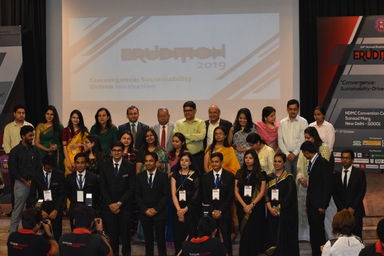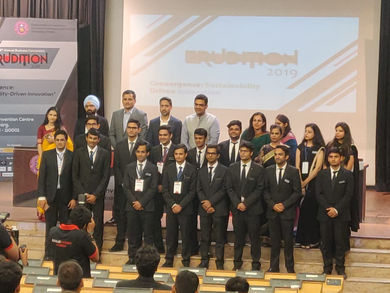(011) 2766-7891, 2766-7725
MBA - INTERNATIONAL BUSINESS
DEPARTMENT OF COMMERCE
DELHI SCHOOL OF ECONOMICS
UNIVERSITY OF DELHI

.png)
Erudition – The Annual Business Convention of the MBA Course at the department provides a common platform to educationists, industrialists, entrepreneurs, financial gurus, and students to share practical knowledge and give their insights on the current scenario of business globally. The future of the country, the capacity and capability of her people and their international competitiveness, hinges on their educational foundation; the Annual Convention seeks to strengthen this very foundation by exposing students to industry leaders and their school of thought.
Owning to the meaning of the term ‘Erudite’ “having or showing knowledge that is gained by studying”, Erudition at its helm, offers its participants an opportunity to come together and cherish learning.
Till now, the college has hosted 24 successful conventions.
It is a 2 day event focused on a different theme every year with one day devoted to IB and another to HR. Each day witnesses 3 panel discussions wherein the panel of esteemed speakers discuss on the chosen subtopic. The first day also witnesses an inaugural session with the address from the Head of Department, Course-Coordinators and the esteemed Chief Guest and Guest of Honour.
.png)
2019
"Sustainability Driven Innovation"
4th & 5th October 2019
Erudition 2019 was organized on 4th and 5th of October 2019 at NDMC Convention Center, Sansad Marg, Connaught Place, New Delhi. The event’s theme was Convergence: Sustainability Driven Innovation. Innovation and sustainability have become two major driving forces in the modern world. According to the World Innovation Index, innovation is defined as finding ways to create value and finding new ways of capturing existing value. In today’s dynamic and ever competitive world organisations are being called upon to innovate more than ever before. In fact “innovate or die” has become a modern mantra for policymaking and strategizing functions of organizations.
However the age old debate remains whether innovation at such a rapid pace can be sustained without causing a significant impact on the natural environment and limited natural resources. Society’s needs and wants drive the markets but the markets themselves rely on the natural resources in order to bridge the gap between demand and supply and that is where the environmental impact comes into picture. However the concept of innovation is much more broader than that and therein lies the difficulty in defining it in a precise manner. There are no set standards or criteria for determining whether a given product, process or a way of doing something is sustainable in the long run or not.
Arthur D. Little (2004) defined ‘sustainability-driven’ innovation as ‘the creation of new market space, products and services or processes driven by social, environmental or sustainability issues.’Hence there is an emerging understanding that sustainable innovation is not just about new concepts but is about commercialization of technologies, products and services and about entrepreneurship. Innovation can also be about the adoption of new processes and systems at societal level.Hence Sustainable innovation can be defined as a process where sustainability considerations (environmental, social, financial) are integrated into company systems at each and every stage from idea generation through to research and development (R&D) and commercialization. This applies to products, services and technologies, as well as new business and organization models. Need of the hour is to find ways to innovate sustainably and find new ways of combining the goals of sustainability with those of the organizations.
The event had three panel discussions among several prominent leaders from various fields who shared their thoughts and ideas and highlighted the issues being faced by the organizations during the current times.
Panel 1: Behavioural Investments: Dealing with Hybrid Markets
Behavioral finance, proposes psychology-based theories to explain stock market anomalies, such as severe rise or fall in stock price. The purpose is to identify and understand why
people make certain financial choices. Within behavioral finance, it is assumed the information structure, and the characteristics of market participants systematically influence
individuals' investment decisions as well as market outcomes. Behavioural Investments goes above and under the traditional statistical approach, venturing into the realm of psychology and studying investment patterns. It attempts at understanding investor sentiments and cracking down complex structures into simpler arrangements. However, it may not be a standalone mantra to predict and react. On the contrary it may simplify mental models and help crack the code for mind boggling anomalies in the investment landscape.
Sub Tracks:
1. Improving investment capabilities
2. Enhancing risk management
3. Improving sales capabilities
4. Mental patterns of Investing
5. Hedge Funds
6. Managed Futures & Options
7. Real Estate
8. Commodities and Derivatives contracts
9. Holistic strategies for attracting investment
Panelists
SK Gupta- MD- CEO- IPA at ICAI
(https://www.linkedin.com/in/dr-s-k-gupta-01780b158/ )
Rahul Sarin- Executive Director at Avendus Wealth Management
(https://www.linkedin.com/in/rahul-sarin-2004116/)
Siddharth Dasgupta- Associate Director at Ernst & Young
Ashish Kila- CA- Director at Perfect Group
(https://www.linkedin.com/in/ashishkila/ )
Hemendra Mathur- Venture Partner at Bharat Innovation Fund
(https://www.linkedin.com/in/hemendra333/ )
Shivam Sharma- Director- Coverage at Barclays
Panel 2: Globalisation in Transition : Future of Trade and value chain
Although tariffs dominate the headlines, significant structural modifications have mainly gone unnoticed in the nature of globalization. Some of the changes have been obscured by the
global financial crisis and recession. Ten years on, the analysis of the dynamics of global value chains reveals several transformations that have been hidden in sight. As an example,
output and trade continue to increase in absolute terms, the trade intensity is declining in almost every good-producing value chain. The flow of services and data now plays a much
larger role in bringing the global economy together. Trade in services is not only growing faster than trade in goods, but services are creating value far beyond what national accounts
measure. In addition, all global value chains are becoming increasingly knowledge-intensive. As a factor of production, low-skill labour is becoming less important. All the above shows that globalization is in the midst of transformation. Yet the public debate on trade is often about recapturing the past rather than looking to the future. Understanding how the landscape is shifting is a need for future entrepreneurs, business leaders and policy makers to help them prepare for the next chapter of globalization and the opportunities and challenges it will present.
Sub Tracks :
1. Liberalization
2. Globalization
3. Privatization
4. US-China trade war
5. Global protectionism policies
6. SEZs and EPZs
7. Future of WTO
8. Ripple effect
9. Shift towards service oriented value chains
Panelists
Shashwat Anand - Associate Director at Cognizant
Technology Solutions
(https://www.linkedin.com/in/shashwat-anand-8a54176/ )
Karan Pahuja -President at Indian Stainless Steel
Development Association
(https://www.linkedin.com/in/karan-pahuja-a654361a/ )
Dr. S P Sharma - Chief Economist, PHDCCI
Bharat Salhotra- Vice President Sales & Business Development Asia Pacific Region at Alstom
(https://www.linkedin.com/in/bharat-salhotra-6b6578/ )
Ashutosh Chadha - Vice President & Head Public Policy and Government Affairs South Asia at Mastercard
(https://www.linkedin.com/in/ashutoshchadha/ )
Sandeep Puri - Former Head- International Business at Escorts Limited
(https://www.linkedin.com/in/purisandeep/ )
Ashok Mehra - Global Head – Client Transformation at Wipro
Panel 3: Cause Marketing: Driving the Transformation
As somebody said, businesses that do good "do good". A result of this ideology has caused the advent of a new era of cause marketing. Successful marketing is no longer only about
acquiring customers through conventional promotional strategies — it’s about evolving beyond traditional thought and associating with a cause. It goes even further as to building
relationships and retaining loyal customers, those who conform themselves to a cause. It also serves a higher reason by aiming at better lifestyles of all stakeholders thereby creating
sustainable ecosystems that work together. As per a global study, 91% of consumers said they were likely to switch to a brand that supports a good cause, given similar price and quality. Cause marketing goes beyond the ordinary into a dimension of it's own, focusing on pressing issues of the modern world all the while keeping the company objectives in perspective and etching strong memories to associate with brands. Innovating in dimension leaves long lasting impressions into people's memories. Cause marketing often focuses on associating a value system to the brand. But what makes cause marketing different than, say, direct sales, is the system behind it.
Sub Tracks:
1. Value Marketing
2. Consumer Beliefs
3. Growth and Network Effects
4. Social Advertising
5. Sustainable Marketing
6. Product Development
Panelists
Abhijit Das - Head of Marketing at Delhi Duty Free
(https://www.linkedin.com/in/talk2abhijitdas/ )
Kawalpreet singh - Director of marketing at JLL india
(https://www.linkedin.com/in/kawalpreet-singh-2600b411/ )
Pankaj Gupta - India Head- Strategy, Product and Operations at Google
Saurabh Srivastava - Chief Marketing & Product Officer at Houser
(https://www.linkedin.com/in/saurabhdse/ )
Vaibhav Kumar - Vice President & Head of Ecommerce & Digital Marketing at Max Life Insurance Company Ltd
(https://www.linkedin.com/in/vaibhavkumarmaxlife/ )
Agastee Khante - Head of Product & Marketing at The Quint
.jpg)



























